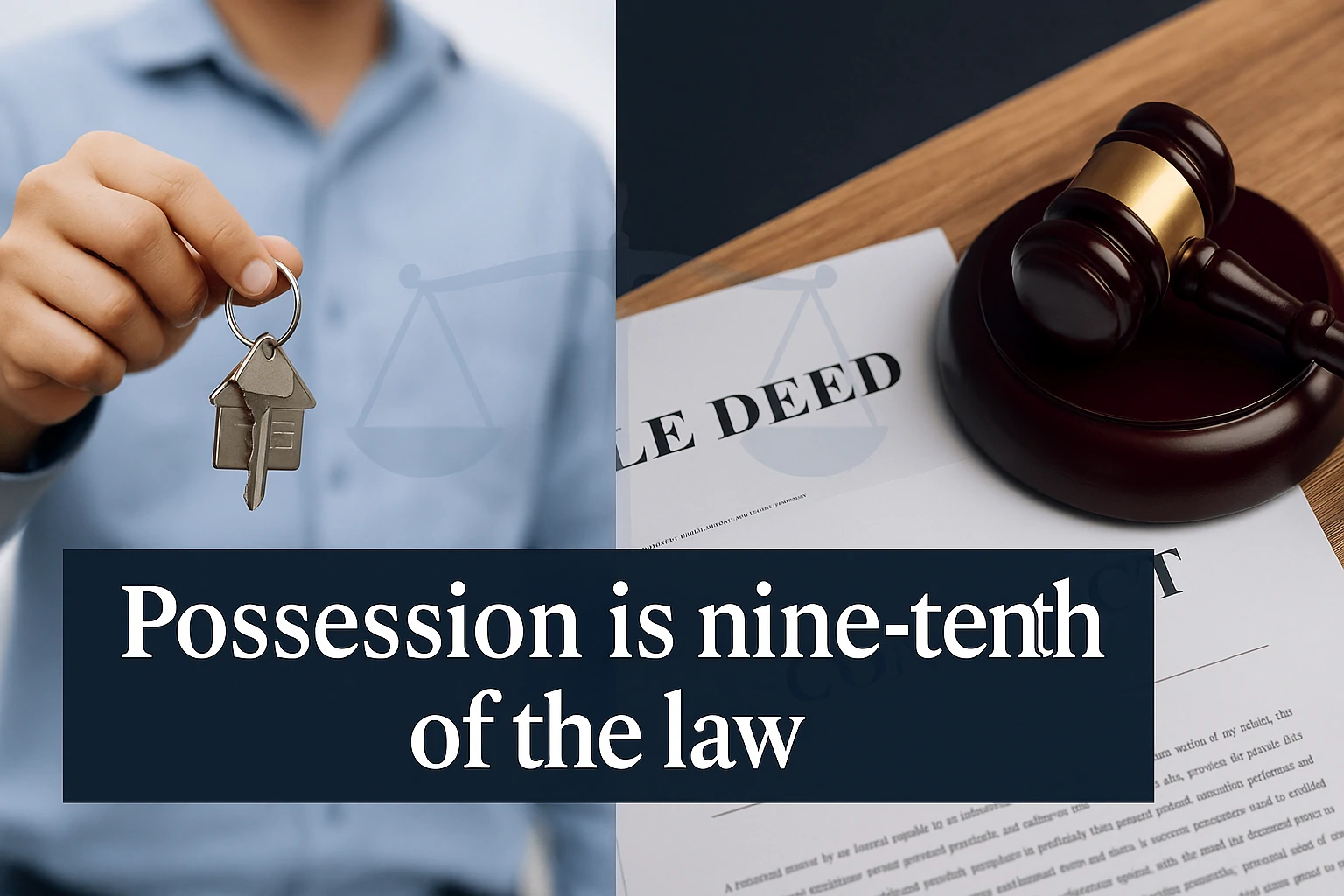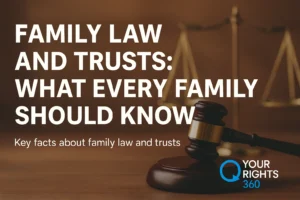Many people know the phrase, Possession is nine-tenths of the law. It often comes up in disputes over land, personal items, or lost goods. The idea seems clear. If you hold it, it must be yours. But the law does not always agree.
Owning something takes more than just holding it. Courts want proof. That can mean a receipt, a signed contract, or a legal title. These records often carry more weight than physical control. Still, possession gives you an advantage. If you have the item, the other person may need to prove their claim.
This saying began in a time when laws were simpler. Courts often trusted the person in control. Now, rules are stricter. But the idea still plays a role in many cases. Possession may not win a case, but it gives you a strong start.
This article breaks down the truth behind the phrase. It explains where it applies, where it does not, and what you should know in real life. Whether you rent, borrow, or find something, these facts can help you understand your legal rights.
What the Phrase Means in Legal Terms
The phrase means that possession gives you a strong position in a dispute. If you hold or control something, you often have the advantage. The court starts with the idea that you belong with the item unless someone else proves otherwise. The phrase does not mean possession equals ownership. It means possession is a powerful sign of it.
In many legal cases, the person without the item must explain why they should have it. The person with possession does not have to say much at first. That gives the possessor a legal head start. But it is not the end of the story. If the other side can bring better proof, the court may shift control.
This balance helps protect people from unfair claims. It stops others from grabbing property without going through the right steps. It also gives courts a clear way to begin the process of deciding who should keep control.
Where the Phrase Came From
The idea comes from old English common law. In those times, people had fewer ways to prove ownership. Documents were rare. Most land and goods changed hands without written proof. If a person had something in hand or under use, they often won the case.
The full version of the phrase was, “Possession is nine points of the law.” It meant possession made up most of the legal proof needed. Courts favored the person who had control. The other party had to bring strong proof to take it away. Over time, the phrase shortened to what we hear today.
This rule helped solve fights over farms, tools, and animals. People trusted what they could see. If you fed the horse and used the land, people assumed it was yours. That belief shaped early law and still affects how courts view possession now.
The Difference Between Possession and Ownership
Possession means you control the item. Ownership means you have full legal rights to it. These are not the same. You can hold something that does not belong to you. You can also own something that someone else holds.
Let’s look at some examples:
A person may rent a place to live. They stay there, pay each month, and use the space. They hold possession. But they do not own it. The owner keeps legal control, even if they never visit.
A friend may lend someone a car. That person can drive it and keep it at home. They have control. But the car still belongs to the person who paid for it. The title proves who owns it.
A thief might take someone’s laptop and hide it. They hold the item but have no right to it. The owner can go to court and ask for it back.
True ownership comes with proof. A signed paper, a deed, or a title shows legal rights. Possession helps in some cases. But it does not beat solid evidence. Courts look for the facts, not just who holds the item.
Want to explore more legal topics in plain English? Visit BestLawyerHub: Your Guide to Legal Help Made Simple for clear answers and practical tips.
How Courts View Possession in Real Disputes
Courts see possession as a strong first step. It gives one side an early lead. If a person holds and uses something, the court may assume they have a right to it. That does not make them the winner. It only means they start with an advantage.
In land cases, the person who lives on the land often has a better claim. Courts do not want to remove people without reason. The other side must bring proof. A deed, a sales paper, or tax records can help make their case.
In fights over items like pets, tools, or furniture, courts look at the facts. They ask who uses the item, where it stays, and how long it has been there. If the person holding it shows care and honest control, they may keep it.
Courts also check for lies. If someone used tricks or theft to get something, the court will not support them. The law protects truth, not bad acts. It favors fairness and real proof.
When Possession Works in Your Favor
Possession can protect your rights in several ways. If you rent a home, the landlord cannot kick you out without going through legal steps. You have legal possession. The landlord must give notice and follow court rules to remove you.
If you find lost property and no one claims it, you may keep it for now. The law protects your right to hold it until someone shows proof of ownership. That keeps you safe from theft claims unless the real owner comes forward.
If you use a piece of land openly and without hiding it, and the true owner stays silent for years, you may gain legal rights. This is called adverse possession. It only works if certain rules are met. It must be open, constant, and without permission from the real owner.
In all these cases, possession gives you protection. It gives you a voice in court and a chance to keep control.
When Possession Is Not Enough
Possession does not always win the case. If you gained control through theft, fraud, or force, the court will not help you. The real owner can step in and take the item back.
If someone lends you something, you must return it when asked. Holding it does not make it yours. Even if you use it daily, the legal right stays with the owner.
Leased items like cars or machines also come with limits. You may drive the car or use the tool, but you do not own it. Once the lease ends, the item must go back. Possession gives you a role, not the final say.
In all these cases, documents matter more than control. Contracts, receipts, and records can break the power of possession. Courts look for the full truth, not just who holds the item.
How Proof Can Beat Possession
In any legal case, the court needs proof. If someone claims you have something that belongs to them, they must show clear evidence. If they do, possession may not help you. You may lose the item even if you held it for a long time.
That’s why keeping records is so important. If you buy a car, keep the title. If you rent out a room, use a written lease. If you sell property, write down the terms. These simple steps protect you from false claims.
On the other hand, if you possess something and no one can prove a better claim, the law helps you. You are not required to prove ownership in every case. The burden falls on the other side to challenge you.
Why the Phrase Still Matters
Even in today’s world of contracts and titles, the phrase still holds meaning. It reminds us that possession creates power. It protects the status quo. It stops people from taking items without legal reason.
The phrase also teaches us to act fast if we lose something. If someone else takes control and we stay silent, we may lose our rights. Courts value action. They reward people who defend their claims with proof and purpose.
In daily life, this phrase helps settle small arguments. If you loan something and want it back, you may need to show it was yours. If someone holds it and says it’s theirs, they may win unless you speak up.
To understand how ownership rights work in real estate, see Constructive Notice in Real Estate. It explains how public records affect property claims.
Conclusion
Possession is nine-tenths of the law is not a full law. It is a legal idea that gives power to the person who holds something. It offers protection but not total control. It sets the stage but does not end the play.
If you hold something, the law often favors you. But if someone else proves a better right, they may win. Possession helps, but ownership wins with clear records.
The best way to protect yourself is to keep proof, act with care, and know your rights. Whether it is land, a home, a tool, or a pet, holding it gives you a voice, but truth, proof, and fairness make the final call.
This article is for general information only. It does not provide legal advice. For help with a specific legal issue, please consult a licensed attorney.




